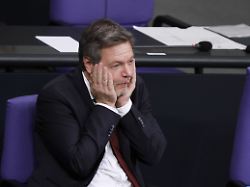“Pored over tables for a long time”
Habeck admits: household cleaning is not optimal
December 15, 2023, 3:33 p.m
Listen to article
This audio version was artificially generated. More info | Send feedback
Federal Economics Minister Habeck would like to see a restart of the traffic light coalition after the difficult negotiations on the 2024 budget. At the same time, he admits that the solution demands a lot from the country and its citizens.
Vice-Chancellor Robert Habeck does not consider the traffic light government’s budget agreement to be optimal. “If you ask me as Minister of Economic Affairs, I have to say that in this… economic phase, something else would actually be economically necessary – namely significantly more investment,” said the Green politician in an interview with t-online. “Our country has structural problems, from education to road renovation. We should do more here, that would also help the economy and the economy. My concern is that it the economy will be difficult next year becomes.”
The traffic light leaders – Chancellor Olaf Scholz, Finance Minister Christian Lindner and Habeck – agreed this week on new cornerstones for the 2024 budget. The debt brake anchored in the Basic Law should initially be adhered to, provided that support for Ukraine does not become significantly more expensive.
The billion-dollar gap in the budget following the Constitutional Court ruling in mid-November was closed with savings and additional burdens for companies and citizens. The negotiations between the traffic light trio lasted around three weeks. Measures such as increasing the CO2 price and the planned removal of tax breaks for agricultural diesel are met with protest.
Time for a restart
“We pored over tables for a very long time, shifted sums back and forth and discussed whether these measures were good, right and reasonable,” said Habeck. These were challenging negotiations. “We have basically renegotiated parts of the coalition agreement.” Even if the last two years have been difficult, primarily because of the war in Ukraine, the next two years will not be easier.
However, Habeck also draws positive things from the negotiations. “The government coalition has shown that it can reach agreements even on difficult issues. This would be a good moment for a new start.”
Habeck also defended the larger increase in the CO2 price for refueling and heating. “There is a social balance. We have abolished the EEG levy, so next year 85 percent of the income from the CO2 price will flow directly back to citizens and the economy. This is climate money via the electricity price. There is currently a certain forgetfulness.” The previous government set a CO2 price path. “We reduced that during the energy crisis; now we’re going back to exactly that.”
“Under the given conditions, we have developed a viable solution,” said Habeck. “This solution demands a lot from the country and its citizens. But it is an overall solution with which we can continue to make important investments possible, obtain significant relief and maintain social balance.”
